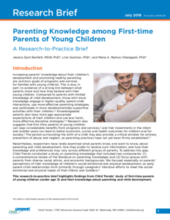Increasing parents’ knowledge about their children’s development and promoting healthy parenting are common goals of programs and services for families with young children. This is due, in part, to evidence of a strong link between what parents know and how they behave with their young children. Compared to parents with limited knowledge of child development, those with more knowledge engage in higher-quality parent-child interactions, use more effective parenting strategies, and participate in more developmentally supportive activities with their children. Knowledgeable parents also have more age-appropriate expectations of their children and use less harsh, more effective discipline strategies. Research also suggests that first-time parents of young children can reap considerable benefits from programs and services, and that investments in the infant and toddler years can lead to better economic, social, and health outcomes for children and for society. The period surrounding the birth of a child may also provide a critical window for primary prevention of abuse and neglect, as parenting practices have not yet been firmly established.
Nevertheless, researchers have rarely examined what parents know, and want to know, about parenting and child development, how they prefer to receive such information, and how their knowledge and preferences may vary across different groups of parents. To address this gap, Child Trends conducted a study on parenting knowledge that included two components: (1) a comprehensive review of the literature on parenting knowledge; and (2) focus groups with parents from diverse racial, ethnic, and economic backgrounds. We focused especially on parents’ perceptions of their knowledge of children’s social-emotional and physical development, as early parent-child relationships form primarily through caregivers’ intensive efforts to meet the social-emotional and physical needs of their infants and toddlers.
This research-to-practice brief highlights findings from Child Trends’ study of first-time parents of young children (under age 3) and their knowledge about parenting and child development.

